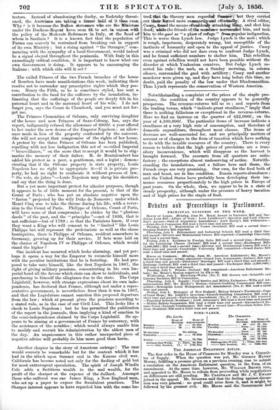. The exiled Princes of the two French branches of
the house of Bourbon have made manifestations this week, indicating their resolve not to surrender any prescriptive rights which they pos- sess. Henry the Fifth, as he is sometimes styled, has sent a contribution to the fund for the sufferers by the inundation, in- timating that the sufferings of the people are deeply felt in. his paternal heart and in the maternal heart of his wife. I do not forget you, says the Count de Chambord, and you must not for- get me.
The Princess Clementine. of Orleans, only surviving daughter of the house and now Princess of Saxe-Coburg, has, says the report, indignantly refused the allowance of 8000/. a year offered to her under the new decree of the Emperor Napoleon ; an allow- ance made in lieu of the property confiscated by the autocrat. She will not accept that compromise of the rights of her house. A protest by the three Princes of Orleans has been published, repelling with not less indignation this act of so-called Imperial " bienveillance, " on the score that to accept it would be to stig- matize the memory of their father. M. de Montalembert has added his protest as a peer, a gentleman, and a legist ; demon- strating that if the Orleans property is state property, Louis Napoleon has no right to appropriate it—if it is private pro- perty, he had no right to confiscate it without process of law. "Sic vole, sic jubect,"—Louis Napoleon. may shrug his shoulders and say that the thing is done.
But a yet more important protest for ulterior purposes, though it appears to be of little moment for the present, is that of the Count of Paris ; who has put an absolute negative upon the " fusion " projected by the wily Duke de Neraours ; under which Henri Cinq was to take the throne during his life, with a rever- sion to the Count of Paris. Philippe of Orleans, Count of Paris, will have none of that compromise : he abides by the "glorious deeds" of the past, and the "principles "—not of 1830, that is net sufficient—but of 1789; so that the Parisians know, if ever they want a King who will consent to be " limited " like Louis Philippe but will represent the proletariate as well as the °lasso boutiquiere, there is Philippe of Orleans, resident somewhere in Germany, growing up for their service. If bets were laid on the chance of Napoleon. IV or Philippe of Orleans, which would stand the higher ?
One incident has occurred which looks alarming, and yet per- haps it opens a way for the Emperor to reconcile himself more with the peculiar institutions that he is fostering. He had pro- posed to take unto himself, like the first Napoleon in 1807,, the right of giving military pensions, concentrating in. his own Im- perial hand all the favour which state can show to individuals, and purchasing to himself the allegiance due to the state. The Corps Legislatif, however, with strange expressions about its own inde- pendence, has declared that France, although not under a repre- sentative government, is nevertheless freer than it was in 1807, and that the Legislature cannot sanction this proposed departure from the law ; which at present gives the pensions according to a stated rule, as in the case of our Civil List. This looks like a cheek to Louis Napoleon ; but he has permitted the publication of the report in the journals, thus implying a kind, of sanction. to the semi-independence claimed by the Corps Legislatif. He ap- pears to be aiming at a government of France by autocracy; with the assistance of the notables ; which would always enable him to- modify and, recruit his Administration by the ablest men of the day. An acquiescence in this rather unexpected piece of negative advice will probably do him more good than. harm.


































 Previous page
Previous page